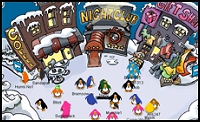State of Play Academy in “There” Calendar Online
May 2nd, 2007 by Benjamin Duranske
 I still hate “There” more than any other piece of software I’ve ever used to interact with other people (and I’ve used Groupwise, so that’s saying something) but enough lectures and panels on virtual law are scheduled at the State of Play Academy over the next few months that readers who can stomach There’s counterintuitive interface, limited tools, and general inanity may want to consider grimacing along with me in order to attend what look to be some pretty good events.
I still hate “There” more than any other piece of software I’ve ever used to interact with other people (and I’ve used Groupwise, so that’s saying something) but enough lectures and panels on virtual law are scheduled at the State of Play Academy over the next few months that readers who can stomach There’s counterintuitive interface, limited tools, and general inanity may want to consider grimacing along with me in order to attend what look to be some pretty good events.
In the next week alone, there are lectures on local cultures in the global media space (tomorrow), the Fourth Amendment and voluntary information collection (next Monday), the trade secret doctrine of “inevitable disclosure,” (next Tuesday) and “indirect enforcement” of intellectual property law (also next Tuesday). Here’s a link to the 2007 SOPA calendar for more information.
If you go to any of these, look for me. My avatar in There is ‘BenjaminNoble’ (spaces aren’t allowed) and I’ll be wearing an ugly yellow shirt, board shorts, and leather mandals (this outfit appears to be an everlasting punishment for my unwillingness to give Makena Technologies any money). You thought Sisyphus had it bad.
Related Posts on Virtually Blind
- What the Hell am I Doing “There?”: "I'll try to be open minded here, but it's going to be hard. I set up..." (8 comments)
- Harvard Extension Class on Virtual Law Offers Lectures in Second Life: "The Harvard Extension School is running a course focused on virtual..." (3 comments)
- Student Presentation on Virtual Law: "Just a quick post closing out an ugly week in virtual law on a more..." (0 comments)





 Wolf, however, was back on the mean streets of San Francisco
Wolf, however, was back on the mean streets of San Francisco  In the not-so-serious virtual crime department, Wired recently covered a
In the not-so-serious virtual crime department, Wired recently covered a  In addition, they’ve built in self-policing. After an account is 30 days old, the penguin can become a “Secret Agent” and report other players’ misdeeds to the moderators. I assume most kids opt-in to this, since it sounds cool.
In addition, they’ve built in self-policing. After an account is 30 days old, the penguin can become a “Secret Agent” and report other players’ misdeeds to the moderators. I assume most kids opt-in to this, since it sounds cool.